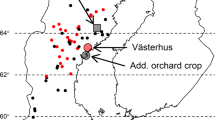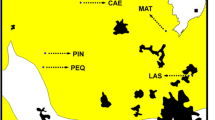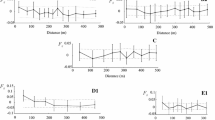Abstract
The use of microsatellite markers provides a window into the evolutionary processes of a given species. As such, these markers are widely used in scientific and applied research and are praised for their practicality and ease of use; however, the unavoidable incidence of genotyping deviations has been broadly neglected in the literature. Therefore, the present study aimed to estimate the rate of null alleles, mutations, and genotyping errors in microsatellite loci, using Araucaria angustifolia, a threatened species, as a case study. We estimated the rates of the different types of genotyping deviations using mother-progeny genotype comparison from 50 seed-trees and their respective progeny (seeds). A total of 2336 A. angustifolia samples were genotyped, and we found that the rate of null alleles was 0.045. From the 1972 mother-progeny comparisons, the overall genotype deviation rate was 1.58%, consisting of 145 inconsistences (mutations), 339 null alleles, and 210 genotyping errors. In terms of seed numbers, 128 (6.5%) showed inconsistencies in at least one locus, 118 (6.0%) null alleles, and 321 (16.3%) genotyping errors. This is the first study to describe the inconsistences (mutations) between mother-progeny genotypes for A. angustifolia, and the outcome makes it clear that an understanding of these genotyping deviations must be considered in assessing the accuracy of inferences made based on population genetics analyses.

Similar content being viewed by others
References
Ashley MV (2010) Plant parentage, pollination, and dispersal: how DNA microsatellites have altered the landscape. CRC Crit Rev Plant Sci 29:148–161. https://doi.org/10.1080/07352689.2010.481167
Ashley MV, Dow BD (1994) The use of microsatellite analysis in population biology: background, methods and potential applications. EXS 69:185–201. https://doi.org/10.1007/978-3-0348-7527-1_10
Bacles CFE, Ennos RA (2008) Paternity analysis of pollen-mediated gene flow for Fraxinus excelsior L. in a chronically fragmented landscape. Heredity (Edinb) 101:368–380. https://doi.org/10.1038/hdy.2008.66
Bonin A, Bellemain E, Eidesen PB et al (2004) How to track and assess genotyping errors in population genetics studies. Mol Ecol 13:3261–3273. https://doi.org/10.1111/j.1365-294X.2004.02346.x
Burczyk J, DiFazio SP, Adams WT (2004) Gene flow in forest trees: how far do genes really travel? For Genet 11:179–192. https://doi.org/10.1016/j.foreco.2004.05.003
Chakraborty R, Kimmel M, Stivers DN et al (1997) Relative mutation rates at di-, tri-, and tetranucleotide microsatellite loci. Proc Natl Acad Sci U S A 94:1041–1046
Chapuis MP, Estoup A (2007) Microsatellite null alleles and estimation of population differentiation. Mol Biol Evol 24:621–631. https://doi.org/10.1093/molbev/msl191
Costa NCF, Guidolin AF, Vargas OF, Mantovani A (2015) Efeitos da paisagem de campo e florestamento com Pinus na diversidade e estrutura genética de pequenas populações remanescentes de Araucaria angustifolia. Sci For Sci 43:551–560
Dakin EE, Avise JC (2004) Microsatellite null alleles in parentage analysis. Heredity (Edinb) 93:504–509. https://doi.org/10.1038/sj.hdy.6800545
Dewoody J, Nason JD, Hipkins VD (2006) Mitigating scoring errors in microsatellite data from wild populations. Mol Ecol Notes 6:951–957. https://doi.org/10.1111/j.1471-8286.2006.01449.x
Doyle JJ, Doyle JL (1990) Isolation of plant DNA from fresh tissue. Focus (Madison) 12:13–15
Ellegren H (2000) Heterogeneous mutation processes in human microsatellite DNA sequences. Nat Genet 24:400–402. https://doi.org/10.1038/74249
Ellegren H (2004) Microsatellites: simple sequences with complex evolution. Nat Rev Genet 5:435–445. https://doi.org/10.1038/nrg1348
Fan H, Chu JY (2007) A brief review of short tandem repeat mutation. Genomics, Proteomics Bioinforma 5:7–14. https://doi.org/10.1016/S1672-0229(07)60009-6
Göring HHH, Terwilliger JD (2000) Linkage analysis in the presence of errors II: marker-locus genotyping errors modeled with hypercomplex recombination fractions. Am J Hum Genet 66:1107–1118. https://doi.org/10.1086/302798
Grimaldi MC, Crouau-Roy B (1997) Microsatellite allelic homoplasy due to variable flanking sequences. J Mol Evol 44:336–340
Hammer O, Harper DAT a T, Ryan PD (2001) PAST: Paleontological statistics software package for education and data analysis. Palaeontol Electron 4(1):1–9. https://doi.org/10.1016/j.bcp.2008.05.025
Hoffman JI, Amos W (2005) Microsatellite genotyping errors: detection approaches, common sources and consequences for paternal exclusion. Mol Ecol 14:599–612. https://doi.org/10.1111/j.1365-294X.2004.02419.x
Hopley T, Zwart AB, Young AG (2015) Among-population pollen movement and skewed male fitness in a dioecious weed. Biol Invasions 17:2147–2161. https://doi.org/10.1007/s10530-015-0867-6
Jones AG, Small CM, Paczolt KA, Ratterman NL (2010) A practical guide to methods of parentage analysis. Mol Ecol Resour 10:6–30. https://doi.org/10.1111/j.1755-0998.2009.02778.x
Kalinowski ST, Taper ML (2006) Maximum likelihood estimation of the frequency of null alleles at microsatellite loci. Conserv Genet 7:991–995. https://doi.org/10.1007/s10592-006-9134-9
Kalinowski ST, Taper ML, Marshall TC (2007) Revising how the computer program CERVUS accommodates genotyping error increases success in paternity assignment. Mol Ecol 16:1099–1106. https://doi.org/10.1111/j.1365-294X.2007.03089.x
Kelkar YD, Tyekucheva S, Chiaromonte F, Makova KD (2007) The genome-wide determinants of human and chimpanzee microsatellite evolution. Genome Res 18:30–38. https://doi.org/10.1101/gr.7113408
Li JL, Deng H, Lai DB et al (2001) Toward high-throughput genotyping: dynamic and automatic software for manipulating large-scale genotype data using fluorescently labeled dinucleotide Markers. Genome Res 11:1304–1314. https://doi.org/10.1101/gr.159701
Manel S, Gaggiotti O, Waples R (2005) Assignment methods: matching biological questions with appropriate techniques. Trends Ecol Evol 20:136–142. https://doi.org/10.1016/j.tree.2004.12.004
Marriage TN, Hudman S, Mort ME et al (2009) Direct estimation of the mutation rate at dinucleotide microsatellite loci in Arabidopsis thaliana (Brassicaceae). Heredity (Edinb) 103:310–317. https://doi.org/10.1038/hdy.2009.67
Marshall TC, Slate J, Kruuk LEB, Pemberton JM (1998) Statistical confidence for likelihood-based paternity inference in natural populations. Mol Ecol 7:639–655. https://doi.org/10.1046/j.1365-294x.1998.00374.x
Meagher TR, Thompson E (1986) The relationship between single parent and parent pair genetic likelihoods in genealogy reconstruction. Theor Popul Biol 29:87–106. https://doi.org/10.1016/0040-5809(86)90006-7
Medina-Macedo L, Sebbenn AM, Lacerda AEB et al (2015) High levels of genetic diversity through pollen flow of the coniferous Araucaria angustifolia: a landscape level study in Southern Brazil. Tree Genet Genomes 11:814. https://doi.org/10.1007/s11295-014-0814-1
Morin PA, Leduc RG, Archer FI et al (2009) Significant deviations from Hardy-Weinberg equilibrium caused by low levels of microsatellite genotyping errors. Mol Ecol Resour 9:498–504. https://doi.org/10.1111/j.1755-0998.2008.02502.x
Morrissey MB, Wilson AJ (2005) The potential costs of accounting for genotypic errors in molecular parentage analyses. Mol Ecol 14:4111–4121. https://doi.org/10.1111/j.1365-294X.2005.02708.x
Oddou-Muratorio S, Houot ML, Demesure-Musch B, Austerlitz F (2003) Pollen flow in the wildservice tree, Sorbus torminalis (L.) Crantz. I. Evaluating the paternity analysis procedure in continuous populations. Mol Ecol 12:3427–3439. https://doi.org/10.1046/j.1365-294X.2003.01989.x
Panagiotopoulou H, Austin JD, Zalewska K et al (2017) Microsatellite mutation rate in Atlantic sturgeon (Acipenser oxyrinchus). J Hered 108:686–692. https://doi.org/10.1093/jhered/esx057
Pompanon F, Bonin A, Bellemain E, Taberlet P (2005) Genotyping errors: causes, consequences and solutions. Nat Rev Genet 6:847–846. https://doi.org/10.1038/nrg1707
Robledo-arnuncio JJ, Gaggiotti OE (2017) Estimating contemporary migration rates: effect and joint inference of inbreeding, null alleles and mistyping. J Ecol 105:49–62. https://doi.org/10.1111/1365-2745.12680
Salgueiro F, Caron H, De Souza MIF et al (2005) Characterization of nuclear microsatellite loci in South American Araucariaceae species. Mol Ecol Notes 5:256–258. https://doi.org/10.1111/j.1471-8286.2005.00899.x
Schlötterer C (2000) Evolutionary dynamics of microsatellite DNA. Chromosoma 109:365–371
Schmidt AB, Ciampi AY, Guerra MP, Nodari RO (2007) Isolation and characterization of microsatellite markers for Araucaria angustifolia (Araucariaceae). Mol Ecol Notes 7:340–342. https://doi.org/10.1111/j.1471-8286.2006.01602.x
Scott LJ, Shepherd M, Henry RJ (2003) Characterization of highly conserved microsatellite loci in Araucaria cunninghamii and related species. Plant Syst Evol 236:115–123
Seaman SR, Holmans P (2005) Effect of genotyping error on type-I error rate of affected sib pair studies with genotyped parents. Hum Hered 59:157–164. https://doi.org/10.1159/000085939
Selkoe KA, Toonen RJ (2006) Microsatellites for ecologists: a practical guide to using and evaluating microsatellite markers. Ecol Lett 9:615–629. https://doi.org/10.1111/j.1461-0248.2006.00889.x
Shinde D, Lai Y, Sun F, Arnheim N (2003) Taq DNA polymerase slippage mutation rates measured by PCR and quasi-likelihood analysis: (CA/GT)n and (A/T)n microsatellites. Nucleic Acids Res 31:974–980. https://doi.org/10.1093/nar/gkg178
Slavov GT, Howe GT, Gyaourova AV et al (2005) Estimating pollen flow using SSR markers and paternity exclusion: accounting for mistyping. Mol Ecol 14:3109–3121. https://doi.org/10.1111/j.1365-294x.2005.02620.x
Van Oosterhout C, Hutchinson WF, Wills DPM, Shipley P (2004) MICRO-CHECKER: software for identifying and correcting genotyping errors in microsatellite data. Mol Ecol Notes 4:535–538. https://doi.org/10.1111/j.1471-8286.2004.00684.x
Vieira MLC, Santini L, Diniz AL, Munhoz C d F (2016) Microsatellite markers: what they mean and why they are so useful. Genet Mol Biol 39:312–328. https://doi.org/10.1590/1678-4685-GMB-2016-0027
Vranckx G, Mergeay J, Cox K et al (2014) Tree density and population size affect pollen flow and mating patterns in small fragmented forest stands of pedunculate oak (Quercus robur L.). For Ecol Manage 328:254–261. https://doi.org/10.1016/j.foreco.2014.05.044
Waits L, Taberlet P, Swenson JE et al (2000) Nuclear DNA microsatellite analysis of genetic diversity and gene flow in the Scandinavian brown bear (Ursus arctos). Mol Ecol 9:421–431. https://doi.org/10.1046/j.1365-294x.2000.00892.x
Wang J (2010) Effects of genotyping errors on parentage exclusion analysis. Mol Ecol 19:5061–5078. https://doi.org/10.1111/j.1365-294X.2010.04865.x
Wang J (2018) Estimating genotyping errors from genotype and reconstructed pedigree data. Methods Ecol Evol 9:109. https://doi.org/10.1111/2041-210X.12859
Wattier R, Engel CR, Saumitou-Laprade P, Valero M (1998) Short allele dominance as a source of heterozygote deficiency at microsatellite loci: experimental evidence at the dinucleotide locus Gv1CT in Gracilaria gracilis (Rhodophyta). Mol Ecol 7:1569–1573. https://doi.org/10.1046/j.1365-294x.1998.00477.x
Weber JL, Wong C (1993) Mutation of human short tandem repeats. Hum Mol Genet 2:1123–1128. https://doi.org/10.1093/hmg/2.8.1123
Zou G, Zhao H (2004) The impacts of errors in individual genotyping and DNA pooling on association studies. Genet Epidemiol 26:1–10. https://doi.org/10.1002/gepi.10277
Acknowledgments
We thank the Santa Catarina State University (UDESC) and Laboratório DNA UDESC, for logistical support, and, finally, landowners M. Duarte and J.A.R. Ribeiro for allowing access to their property.
Funding
We would like to thank the Fundação de Amparo a Pesquisa e Inovação do Estado de Santa Catarina (FAPESC) for providing financial support (project 14848/2011-2); the Coordenação de Aperfeiçoamento de Pessoal de Nível Superior (CAPES) for doctoral scholarships to N.C.F.C., M.B.L., and L.I.B.S. (Finance Code 001); and to the Conselho Nacional de Desenvolvimento Científico e Tecnológico—CNPq for the scholarship awarded to R.O.N.
Author information
Authors and Affiliations
Contributions
This research represents part of a Ph.D. thesis of N.C.F.C. that designed the research with the contribution of M.B.L., L.I.B.S. and R.O.N.; N.C.F.C. and L.I.B.S. collected the samples and performed the laboratory procedures; N.C.F.C. performed the analysis and wrote the draft of the manuscript. All authors have contributed towards manuscript writing, read and approved the final manuscript.
Corresponding author
Ethics declarations
Conflict of interest
The authors declare that they have no conflict of interest.
Data archiving statement
The data archiving has been completed. We submitted the data to the TreeGenes Database and data accession is avaliable at https://doi.org/10.5281/zenodo.3406797.
Additional information
Communicated by F. P. Guerra
Publisher’s note
Springer Nature remains neutral with regard to jurisdictional claims in published maps and institutional affiliations.
Rights and permissions
About this article
Cite this article
da Costa, N.C.F., Stedille, L.I.B., Lauterjung, M.B. et al. Distinguishing mutations and null alleles from genotyping errors using mother progeny comparisons in Brazilian pine (Araucaria angustifolia). Tree Genetics & Genomes 15, 78 (2019). https://doi.org/10.1007/s11295-019-1388-8
Received:
Revised:
Accepted:
Published:
DOI: https://doi.org/10.1007/s11295-019-1388-8




